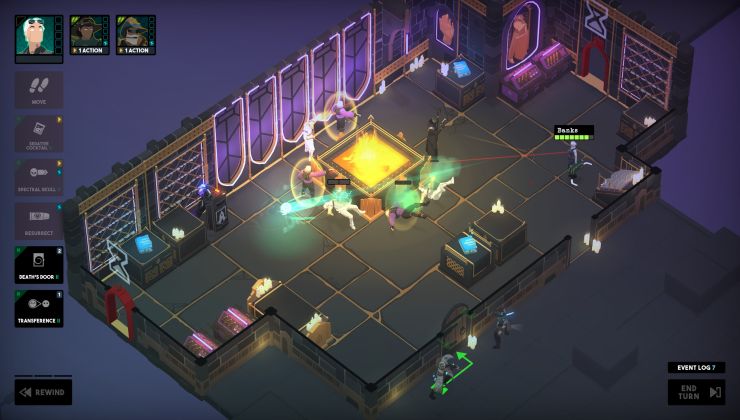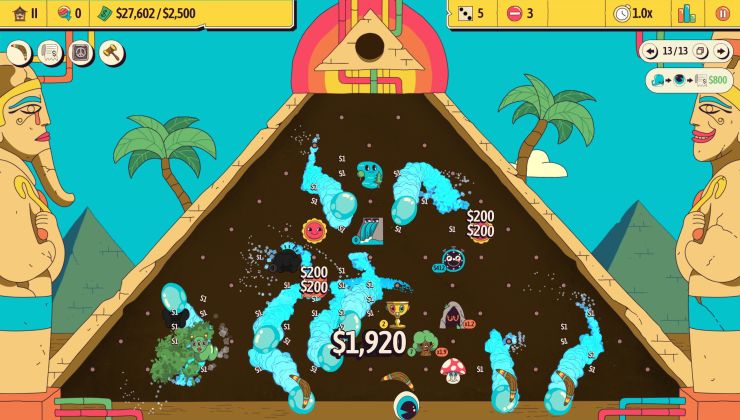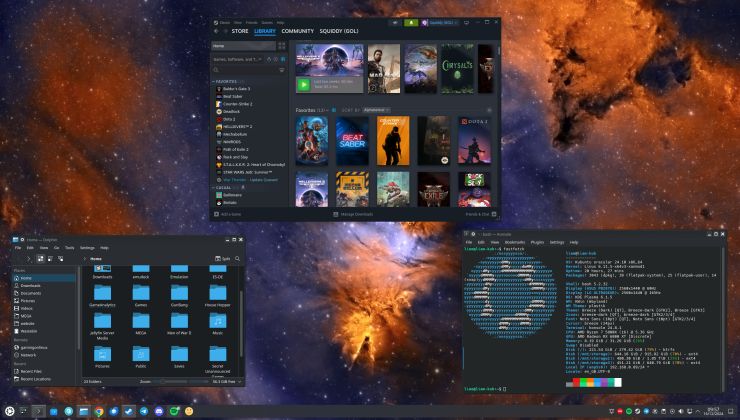Despite Luna originally using Windows for Amazon's game streaming service, it appears they may be moving over to Linux and they're looking to hire people to work on Proton / Wine and give back to open source.
Hold up. Don't know what Proton is? It's part of Valve's Steam Play, be sure to check out our full guide.
Across a few job adverts (#1, #2, #3), they mention how the roles involve "working with Proton - a compatibility layer to run Windows games on Linux using Wine" and that they are "committed to working with the open source community around Proton. This role will commit code to open source projects such as Proton and Wine in pursuit of running games in a stable and performant manner".
Regardless of your thoughts on cloud gaming, this is still pretty great news for Proton and Wine that might see more people work on it and improve it further to get Windows games running even better on Linux!
Amazon give a little more detail on the roles that you can expect to "solve hard technical problems in Linux graphics stack, starting from Linux Kernel to graphics libraries" and work with "DirectX, Vulkan, DXVK, and OpenGL" and of course "dive deep into graphics performance issues and provide solutions that enable Windows games run on Linux, and make contributions to open source Wine/Proton".
Perhaps with Amazon working directly with Linux and Wine / Proton, they might even officially support playing Luna on Linux, whereas last we saw it threw up a box to say it's not supported. Would be thoroughly odd to go through all this, and still not even support playing it on Linux since it just uses a browser.
Luna is what a lot of what people hoped / thought Stadia would be initially, with subscription based to access a growing library of games, rather than Stadia being a store with an optional subscription part. It will be interesting to see how Luna progresses once it's out of Early Access and expands from being only for the US right now.
Luna is what a lot of what people hoped / thought Stadia would be initially, with in subscription based to access a growing library of games, rather than Stadia being a store with an optional subscription part.
Strange. Stadia itself looks good. It's just that Google has fallen into the same trap as everyone else - no one wants to give up their Steam library.
Actually, I'm waiting for Valve to launch its own streaming service on its servers. You don't need to be a predictor to understand that Steam streaming is Valve's next project after the release of Steam Deck.
That's why they invest in Linux/Proton. And SteamOS will be the core of the service.
Actually, I'm waiting for Valve to launch its own streaming service on its servers. You don't need to be a predictor to understand that Steam streaming is Valve's next project after the release of Steam Deck.I made a prediction / hope on a Valve streaming service back in 2018.
I made a prediction / hope on a Valve streaming service back in 2018.
Sure. After all, streaming is the future.
New players like Google and Amazon have already entered here. Microsoft is also pulling up.
If Valve doesn't launch its streaming service in the next year or two, they may lose everything. And no Linux will save them. That's why I'm a little scared for Valve. I hope Gabe and Co know what they are doing and will not miss the moment.
I made a prediction / hope on a Valve streaming service back in 2018.
Sure. After all, streaming is the future.
New players like Google and Amazon have already entered here. Microsoft is also pulling up.
If Valve doesn't launch its streaming service in the next year or two, they may lose everything. And no Linux will save them. That's why I'm a little scared for Valve. I hope Gabe and Co know what they are doing and will not miss the moment.
I have no doubt they're thinking of something and have been steadily building the foundations. Whatever they build, it should capitalize on the users exisiting catalogue and work with 99,5% of it (where steam machines 1.0 failed).
You can already stream your Steam games from one device into the other. And with Nvidia Geforce NOW or Shadow you can already play a sizeable portion of your catalogue, even if your hardware could not.
I would hope, that if needed, they could lauch something by the time of a Steam Deck 2nd gen (with a cheaper stream only device tier). They also mentioned various other steam hardware/different takes on the deck on the horizon, and are also heavily invested on VR.
So I'm not currently scared, as they seem to be covering a lot of fronts.
But it is nice to see other players' also benefiting/contributing to the wine/proton ecossystem.
EDIT: Added Box86 paragraph.
Last edited by nullzero on 15 December 2021 at 12:37 pm UTC
I made a prediction / hope on a Valve streaming service back in 2018.
Sure. After all, streaming is the future.
New players like Google and Amazon have already entered here. Microsoft is also pulling up.
If Valve doesn't launch its streaming service in the next year or two, they may lose everything. And no Linux will save them. That's why I'm a little scared for Valve. I hope Gabe and Co know what they are doing and will not miss the moment.
Is it the future though? Some years ago I would have agreed but now I am not so sure.
My point is graphical performance is growing faster than game graphical requirements to the point of having a laptop SoC capaple of running every non-VR game through an emulation layer at 720p (Of course, I am taking of the Steam Deck). So, right now it would be arguable the need of a streaming service hardware-wise (even less in the near feature). And given steam prices I think it is actually cheaper to buy the games than to pay a monthly fee even if you have access to all games (which you don't). With almost all of videogames with 10+h of content, (a lot with 30h and a lot of replayability) you are not going to play a lot of them per month as you would with movies on Netflix.
But you could say:
1) I want VR!: well, the smallest lag in VR can make you throw up so I do not think streaming solutions are there yet.
2) I want to play 4k!: That's what FSR and DLSS are for. It makes more sense to use these technologies than to spend hundreds of euros in a beefed up graphic card when your old laptop can manage almost the same quality with the same performance.
I have been thinking about this for a time now and I wanted to share to see what you people hought about it.
TL;DR: At this rate in the near future every laptop will be able to play any game and upscale it to any desired resolution so the biggest boon for streaming services would be irrelevant. Also, steam is cheap. Any thoughts?
Perhaps with Amazon working directly with Linux and Wine / Proton, they might even officially support playing Luna on Linux, whereas last we saw it threw up a box to say it's not supported. Would be thoroughly odd to go through all this, and still not even support playing it on Linux since it just uses a browser.
But you're not thinking like a manager! If you did, it would make perfect sense! (Oh, please don't start thinking like a manager.
...But this is why streaming is the future. It is more expensive than owning and it provides a lot of content. The moment that people are willing to accept a streaming solution publishers will no longer offer an option to own _because_ it's more expensive to stream. They want that extra money and they know that people are willing to make the trade if the streaming service works well enough (due to the success of streaming services like Netflix over ownership services like Vudu).
And given steam prices I think it is actually cheaper to buy the games than to pay a monthly fee even if you have access to all games (which you don't). With almost all of videogames with 10+h of content, (a lot with 30h and a lot of replayability) you are not going to play a lot of them per month as you would with movies on Netflix.
...
Last edited by compholio on 15 December 2021 at 1:49 pm UTC
Game companies haven't quite jumped ship yet, but the trend looks pretty clear at this point.
Edit: Or to support the Steam Deck with Luna?
Last edited by Mohandevir on 15 December 2021 at 2:15 pm UTC
Is [streaming] the future though? Some years ago I would have agreed but now I am not so sure.
My point is graphical performance is growing faster than game graphical requirements to the point of having a laptop SoC capaple of running every non-VR game through an emulation layer at 720p (Of course, I am taking of the Steam Deck). So, right now it would be arguable the need of a streaming service hardware-wise (even less in the near feature).
Interesting take. Will Bandwidth grow faster than processing power in the future? Time will tell, but I wouldn't bet on it. Especially given that latency is incompressible due to the speed of light, and VR requires low latency.
I wonder the same about energy costs. Both computing and transmission cost will become progressively lower. However it's easier to upgrade computing to 8K than it is for transmission equipment, unless you have dark fiber everywhere.
Some game can probably move to streaming, but others will definitely require local compute power (embedded, or close to a datacenter).
We can also expect hybrids, where some physics calculations are performed in datacenters, for instance. I think something like this exists already on consoles, probably with battlefield.
Strange. Stadia itself looks good. It's just that Google has fallen into the same trap as everyone else - no one wants to give up their Steam library.
Meh, more like nobody wants to invest money in a system that can be shutdown next year, like countless other google services.
Gaming isn't central to google, it's a side project, like everything besides search (and now, compute). Users understand this, developers too (as shown by the lack of enthusiasm about stadia among studios).
I made a prediction / hope on a Valve streaming service back in 2018.
Sure. After all, streaming is the future.
New players like Google and Amazon have already entered here. Microsoft is also pulling up.
If Valve doesn't launch its streaming service in the next year or two, they may lose everything. And no Linux will save them. That's why I'm a little scared for Valve. I hope Gabe and Co know what they are doing and will not miss the moment.
Is it the future though? Some years ago I would have agreed but now I am not so sure.
My point is graphical performance is growing faster than game graphical requirements to the point of having a laptop SoC capaple of running every non-VR game through an emulation layer at 720p (Of course, I am taking of the Steam Deck). So, right now it would be arguable the need of a streaming service hardware-wise (even less in the near feature). And given steam prices I think it is actually cheaper to buy the games than to pay a monthly fee even if you have access to all games (which you don't). With almost all of videogames with 10+h of content, (a lot with 30h and a lot of replayability) you are not going to play a lot of them per month as you would with movies on Netflix.
But you could say:
1) I want VR!: well, the smallest lag in VR can make you throw up so I do not think streaming solutions are there yet.
2) I want to play 4k!: That's what FSR and DLSS are for. It makes more sense to use these technologies than to spend hundreds of euros in a beefed up graphic card when your old laptop can manage almost the same quality with the same performance.
I have been thinking about this for a time now and I wanted to share to see what you people hought about it.
TL;DR: At this rate in the near future every laptop will be able to play any game and upscale it to any desired resolution so the biggest boon for streaming services would be irrelevant. Also, steam is cheap. Any thoughts?
Agree with this but companies only see profit. So if your experience is worse quality but they can spin it to look cheaper and give the illusion of more choice then we will see it take off.
The instant attention span might increase the adoption as people don't want to wait 2 - 4 days to download another 100gb game.. On the plus side for downloading enormous games to your local machine most AAA titles are just recycled buggy propaganda filled crap anyway, kick-started, indie / AA games are where the fun is to be had and they are typically less than 10-15gb usually much less.
Some of The biggest games of the last few years in terms of player base have been able to run on an potato and are small in size. As you said with FSR / DLSS increasing in adoption the hardware window of opportunity to play a decent looking game is widening and i think with the whole Stadia debacle a lot of people became informed as to the negatives of cloud gaming.
edit*
put a small wall of text below ..
Spoiler, click me
i forgot to add, that hardware although expensive at the moment for a PC GPU is actually not that extreme. Your typical phone can cost more than a GPU and people have no problem upgrading that every year or two years, and yet an xbox one s is just £/ $ 250 and game pass is around 7 buckaroos a month ( or squids if your in the UK) which gives you access to a ton of decent games at 1440p-60/1080p-120 (with HDR, which Linux hasn't got there yet) and the steam deck is relative to it's hardware not expensive and will last years and years. Gaming Laptops are now more powerful than a top end desktop PC of a few years ago also. So the only benefit to cloud streaming is instant access to games, but even then the load times i have seen on Stadia were actually much slower than my locally stored games running off an NVME. So it just comes down to download times and the chicken and egg here is that the faster the internet the less need for cloud streaming.
Last edited by Lofty on 15 December 2021 at 3:17 pm UTC
I made a prediction / hope on a Valve streaming service back in 2018.
Sure. After all, streaming is the future.
New players like Google and Amazon have already entered here. Microsoft is also pulling up.
If Valve doesn't launch its streaming service in the next year or two, they may lose everything. And no Linux will save them. That's why I'm a little scared for Valve. I hope Gabe and Co know what they are doing and will not miss the moment.
Poor internet and data caps will prevent that in the USA for the near future.
as for Valve entering the cloud gaming business i dont think they have enough money to host servers, they wouldnt be doing the economics of scale nescessary for this type of service, unlike google, amazon and ms wich already have most their infrastructure in place for other services and just need to add some video cards, and can rent the un used processing power to others who need it.
valve could hold it on thirdy party servers but... look at who are the big 3 in that space:
Google, Amazon and Microsoft! i dont think they can compete with their own hosting for the best service/infra structure.
speaking of it, that is one of the reasons why amazon might be migrating to linux in the first place, developing an in-house operating system based on linux and using all the effort valve has made to break free of the windows depence looks like an much better option than paying royalites to an competitor that control the code of their own product and might better optimize it for their own infra structure, and especially if you do have money to actually compete.
i just hope cloud gaming remain as an sustainable niche rather completely die or completely kill local gaming.
I'm waiting for Valve to launch its own streaming service on Google's servers. Last article about Stadia I saw, people were talking about Google planning to basically rent out the Stadia server infrastructure for people to do their own services through. Valve is a big company, but Google has servers bloody everywhere world wide. I don't see anyone else being capable of beating lag as well as Google. They just screwed up their service, and they don't have Steam's library. Put Google's server strength with Valve's gaming strength and you'd have something hard to beat.Luna is what a lot of what people hoped / thought Stadia would be initially, with in subscription based to access a growing library of games, rather than Stadia being a store with an optional subscription part.
Actually, I'm waiting for Valve to launch its own streaming service on its servers. You don't need to be a predictor to understand that Steam streaming is Valve's next project after the release of Steam Deck.
Mind you, I really don't want streaming games to take over the world. But if there's going to be a streaming service that does well, I'd rather it was one where I have the option of downloading and playing locally, which is how a Valve service would probably work.
If you're a Prime subscriber, in the US at least, you get a couple free games every month, plus a bunch of additional goodies for games you might already own. Most of those freebies are for F2P mobas, BRs, and MMORPGs of some sort, but still there is a lot of swag being thrown around in promos. I fully expect this aspect to be integrated into Luna. If not it would be a colossal misstep by the Luna team.
Regarding Valve, I'm not sure why people would think they would choose Google over AWS or Azure because both of those dwarf Google services by a large margin. Maybe Valve would setup their own infrastructure? Despite AWS being a little expensive it is also highly reliable and pervasive. The ability to replicate servers across regions is huge. I doubt they would chose Azure as Gabe is known for hating on Microsoft. The question I have is why would they choose Google over AWS?
Personally, I like the Xbox GamePass approach which allows you to install titles locally or stream them to your devices under the premium subscription. This approach is a huge bandwidth saver. I think Sony PlayStation is also moving this route in their rumored consolidation of PS Now with PS Plus.
The question I have is why would they choose Google over AWS?
Probably because there is an already established channel of communication between Google and Valve (Project Borealis on Chromebooks). It would make it a natural match to deepen this already existing "agreement".
Edit: But it's just my 2 cents; it might not be that much impactful either (Borealis).
Last edited by Mohandevir on 15 December 2021 at 7:05 pm UTC
Regarding Valve, I'm not sure why people would think they would choose Google over AWS or Azure because both of those dwarf Google services by a large margin.Well, I might be talking through my stylish beret here, but I think there's a distinction to be made between having lots of servers and having widely distributed servers. I don't think latency is such an issue for a lot of the cloud stuff AWS or Azure do. But my understanding is that Google, to have your search results pop up and your Google Doc respond Right Now, has little server groups all over the bloody place. And that they leveraged that to make Stadia have little latency by having people using servers that were physically not that distant. I don't know for sure, but it might be that Amazon and MS' Azure have comparatively few much bigger server farms, which might mean it would be harder, or physically impossible, for them to beat latency issues.
The library I work at has our system in the cloud; I'm in Vancouver and it's hosted 4,000 kilometers away in Toronto (which is sometimes a pain in the ass), and it's only that close because of Canadian privacy laws which basically prohibit Canadians' data being hosted in the US without their explicit consent. I'm thinking that wouldn't work for gaming.
so the lack of games on linux was not the main issue, and now with amazon investing on linux...












See more from me